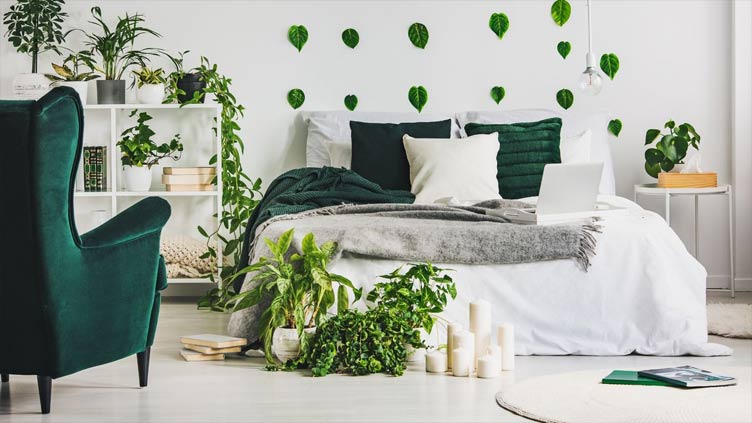Seven plants in bedroom that can help drift off

WeirdNews
Having these in your room will help you fall asleep faster.
LONDON (Web Desk) - According to the NHS, adults need between seven and nine hours sleep. But the good news is that if you re getting less, there are things you can do to help.
You may have tried various breathing techniques such as the 4-7-8 or the military method, but it turns out you can let plants do all the work for you.
Studies have found that having specific plants in the bedroom can have a positive effect on your mood and health.
It can also reduce the symptoms of seasonal affective disorder, which many people experience during winter with the darker nights.
Martin Seeley, sleep expert and CEO of MattressNextDay, has shared seven plants that have sleep-inducing properties.
According to Martin, having these in your room will help you fall asleep faster.
Jasmine
There s a reason Jasmine scent is often used in essential oils to help with relaxation.
It isn t just a pretty plant with white flowers, it also has a sweet smell which has been linked to improved sleep quality, reduced anxiety and stress levels.
Martin said: "Jasmine plants are also easy to keep and require little maintenance, they are small enough to be placed on a windowsill or bedside table, and their appearance helps you to feel calm and relaxed."
Snake plant
Snake plants are great to have as they are easy to take care of, but with its long, thick, snake-like stems it also offers a host of other benefits.
They pump oxygen into the room, which can act as a natural air purifier. It also filters indoor air, removes toxic pollutants and has also been found to boost mental health.
Martin added: "The snake plant could help you to sleep better as it is known to remove harmful chemicals from the air such as toluene, trichloroethylene, xylene and benzene.
"High humidity can often increase the likelihood of mould and dust mites, which can affect your breathing and leave you with a poor night s sleep - so a snake plant works against this and helps to keep your air pure."
Aloe vera
The aloe vera plant has many known properties – including healing sunburn.
But the clever plant can also help you get a better night s sleep by releasing oxygen into the bedroom.
Martin added: "It was named one of the best plants for air purification in this NASA study. Aloe vera is also a very low maintenance plant and does not need much water or sunlight at all.
Lavender
Much like jasmine, lavender is a scent often associated with relaxation and sleep, so it s no surprise having a plant in your room will help you feel more zen.
Martin explained: "Scientifically, lavender has been proven to lower your blood pressure, heart rate and stress levels, which is beneficial if you find that you struggle with anxiety in the evening.
"Many people use lavender sprays on their pillows and bedding, some may use it as an essential oil in their bath, or some keep pouches of dried lavender in their room, but having a lavender plant goes one step further - plus they offer a beautiful purple colour, and purple is often associated with relaxation."
Spider plant
The spider plant, with its long, wiry stems are perfect for the bedroom because they are believed to be the most effective out of all the house plants for purifying air.
NASA studied a crop of spider plants and found that the plants removed 95 per cent of the toxins present within 24 hours, and performed better than other house plants.
Clearer air means we can breathe easier, which in turn aids restful sleep.
Gardenia
Martin calls gardenia a "small but mighty flower", which could be harder to care for in bedrooms as it typically thrives outside.
However, he thinks it s worth trying because of its incredible sleep-inducing properties.
A study found that participants who were given crocetin, an active compound found in gardenia, slept better than those who took a placebo.
Martin said: " If you re up for the challenge, you will need to take good care of your gardenia flower.
"When watering, the water should be tepid, not cold. You must feed every one to two weeks during spring and summer with a diluted liquid feed. During the autumn and winter months, you can feed it once a month."
Valerian
Valerian is an herb that is commonly used in sleep aid supplements because of its calming properties.
It s also a beautiful plant to look at, with its tall stems and white flowers, so it s perfect for the bedroom.
Martin explained: "You can use valerian in a variety of ways to help you sleep. Most people use the root of a valerian as this holds the most sleep inducing properties.
"You can add some of the root to hot water to make a tea. Inhaling the scent if valerian root
has also been found to induce sleep, or you could add a few of the flower buds and petals to your bath."

